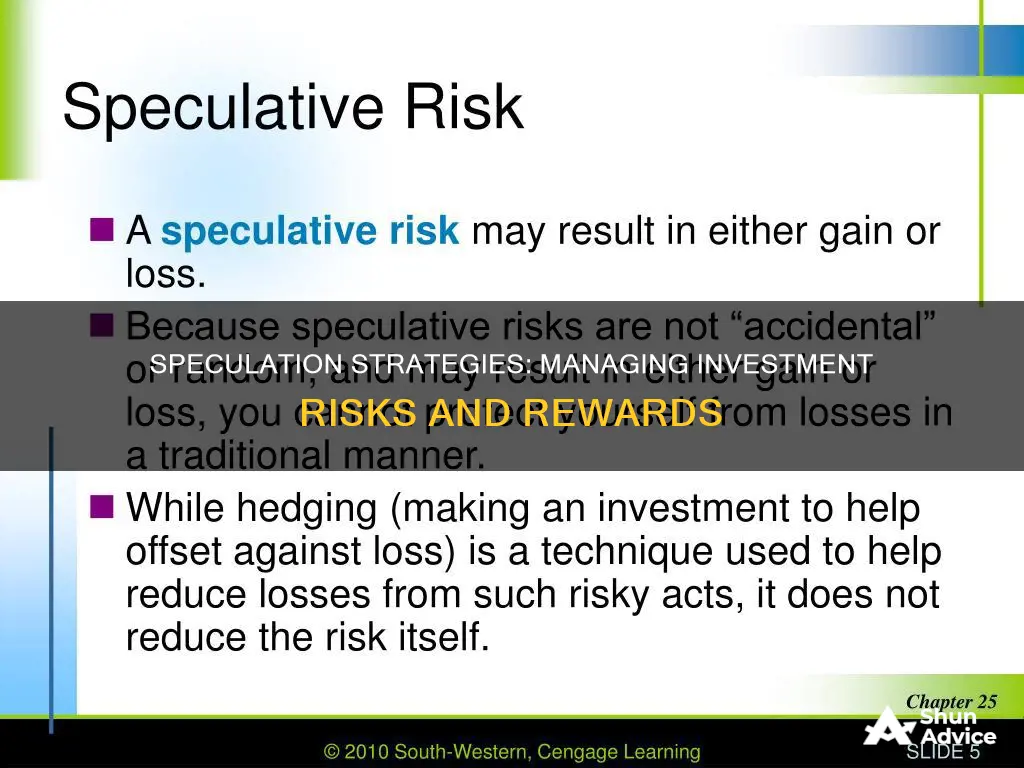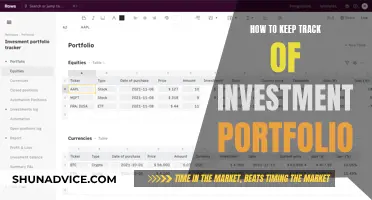
Speculation is a common term in finance that often carries negative connotations. It involves buying or trading an asset with a high probability of failure and a substantial risk of losing value, but also the expectation of significant gain. Speculators are primarily focused on short-term price movements and are willing to accept a high level of risk for the potential of substantial gains. They often predict market movements that other investors might not expect, and their activity can sometimes lead to bubbles and crashes.
| Characteristics | Values |
|---|---|
| Risk | High |
| Returns | High |
| Time horizon | Short-term |
| Focus | Price fluctuations |
| Assets | Commodities, goods, real estate, stocks, bonds, currencies, cryptocurrencies |
| Trading strategies | Futures, options, short selling |
What You'll Learn

Speculation vs. investing: Understanding the differences
Speculation and investing are two different approaches to financial decision-making, each with its own unique characteristics and risks. While both involve putting money into assets, the underlying motivations, strategies, and outcomes can vary significantly. Here is an overview of the key differences between speculation and investing:
Time Horizon
Speculation often involves shorter-term trades and investments, aiming to capitalise on short-term market movements and volatility. Speculators typically focus on buying when prices are low and selling when they are high within a relatively short timeframe. On the other hand, investing usually entails a longer-term perspective, with investors seeking to hold assets for an extended period, often several years or more.
Risk Profile
The level of risk is a critical differentiating factor between speculation and investing. Speculation is generally associated with high-risk endeavours, akin to gambling, where the probability of failure or loss is significant. In contrast, investing typically involves lower-risk endeavours, based on fundamental analysis and a thorough investigation of the soundness and potential for success.
Focus on Price vs. Intrinsic Value
Speculators tend to focus predominantly on price movements and market volatility, aiming to profit from short-term fluctuations. They often pay little attention to the fundamental value or long-term prospects of the underlying asset. In contrast, investors are more concerned with the intrinsic value of the asset and its potential for steady, long-term growth. They base their decisions on factors such as financial reports, earnings, dividends, and the quality of management.
Profit Motivation
The motivation for profit also differs between speculation and investing. Speculators seek abnormally high returns and are willing to take on substantial risk to achieve those returns. They are often motivated by the prospect of substantial gains or losses. In contrast, investors aim for satisfactory returns on their capital, taking on average or below-average risk. They are typically motivated by the prospect of stable, long-term growth rather than short-term windfalls.
Trading Strategies
The trading strategies employed by speculators and investors also differ. Speculators often utilise futures contracts, options (both put and call), and short-selling strategies to capitalise on short-term price movements. They may also engage in day trading or swing trading to profit from short-term market swings. Investors, on the other hand, typically employ a buy-and-hold strategy, focusing on long-term ownership of assets. They may use fundamental or technical analysis to inform their investment decisions and design their portfolios.
Market Impact
Speculation and investing can also have distinct impacts on the market and the economy. Speculation can contribute to market volatility, with speculators' actions potentially causing asset prices to rise or fall sharply, leading to the formation of bubbles or crashes. Investing, on the other hand, tends to have a stabilising effect on the market, as investors focus on long-term value and are less susceptible to short-term market fluctuations.
In conclusion, while both speculation and investing involve financial decision-making and risk-taking, they differ significantly in terms of time horizon, risk profile, focus on price versus value, profit motivation, trading strategies, and market impact. Understanding these differences is crucial for individuals looking to navigate the complex world of finance and make informed decisions about their capital allocation.
Savings Transform to Investment: When and How?
You may want to see also

Speculation strategies
Leverage
Speculators often use leverage to amplify their gains. This involves borrowing money to increase the size of their trades, with the potential for larger profits. However, leverage is a double-edged sword, as it also increases the risk of significant losses.
Market Timing
Market timing is a crucial strategy for speculators, as it involves buying when the market is low and selling when prices peak. However, this strategy is notoriously difficult to execute and requires constant monitoring of market trends and a deep understanding of price drivers.
Risk Management
Successful speculators always have a comprehensive risk management plan. This may include setting stop-loss orders to limit potential losses and diversifying their portfolio to spread risk. Without effective risk management, speculation can resemble gambling.
Technical Analysis
Technical analysis is a tool used by many speculators to predict future price movements. This involves studying historical price data, volume, and market trends. While it doesn't guarantee success, it helps speculators make informed decisions about when to enter or exit a position.
Fundamental Analysis
Fundamental analysis is another strategy employed by speculators. This involves evaluating a company's financial health, including revenue, earnings, and management quality. Speculators use this analysis to spot over- or under-valued companies and make informed investment decisions.
Short-Selling
Short-selling is a speculative strategy where investors profit from a decline in an asset's value. Speculators borrow an asset and sell it, hoping to buy it back at a lower price before returning it to the lender, thus profiting from the price difference.
Pairs Trading and Swing Trading
Pairs trading and swing trading are tactical strategies used by speculators. Pairs trading involves identifying two financially linked stocks and taking opposing positions, expecting one to appreciate and the other to depreciate. Swing trading, on the other hand, focuses on profiting from short-term price movements within an overall trend.
Understanding Investment Portfolios: A Beginner's Guide
You may want to see also

Speculative risk
It is worth noting that speculative risk is not insurable due to the moral hazard involved. However, it can be hedged or limited through various strategies such as market timing, risk management, and technical analysis. Successful speculators often combine these strategies to balance risk and potential rewards.
Overall, speculative risk is an inherent part of the financial markets, and it is important for investors to understand and carefully consider this risk before engaging in speculative investments.
Diversifying Investments: Multiple Portfolios for Better Returns
You may want to see also

Speculation's economic disadvantages
Speculation is often associated with economic bubbles, which can have negative consequences for the economy. A bubble occurs when the price of an asset far exceeds its intrinsic value, and this can be due to speculation. Speculators, who focus on short-term price movements, can drive up demand for an asset, causing its price to surge. This surge in price attracts more buyers, which further fuels the price increase. Eventually, the bubble bursts, leading to a rapid collapse in prices. This was seen during the 2008 financial crisis, where speculation in the housing market led to the collapse of financial institutions.
Another disadvantage of speculation is that it can lead to unreasonable prices, causing price fluctuations that can have long-term impacts on companies, industries, and even entire economies. For example, speculation has been blamed for the oil price shock of 2004-2008, with critics arguing that it led to an artificial rise in demand and an indirect manipulation of market prices.
Speculation can also be considered a non-value-producing economic activity. Speculators make money without producing goods or providing services, which means they are not contributing to society in the same way that producers are.
Furthermore, speculation can lead to bad investments. Speculators may be drawn to buying assets when prices are low, but they may not have a clear strategy for when and how to resell these assets for a profit. If the price of the asset continues to fall, speculators may be forced to resell immediately to avoid further losses, resulting in an even greater decline in the asset's price.
Finally, speculation can be considered a form of gambling if it is not based on informed decisions and careful evaluation. Speculators who bet on future price movements without research are more likely to incur losses.
Equity Investment Management: Understanding the Basics
You may want to see also

Speculation's impact on the economy
Speculation can have both positive and negative impacts on the economy. On the one hand, speculators can contribute to market liquidity and efficiency, support young companies, and drive forward the overall economy. On the other hand, speculation can lead to economic bubbles, market manipulation, and price fluctuations that can impact the stability of companies, industries, or even entire economies.
Positive Impacts of Speculation on the Economy
Speculators play an important role in financial markets by creating liquidity in the market and making it easier for buyers and sellers to trade. They also provide capital to young companies, enabling them to grow and expand. Speculators are typically more willing to invest in unproven companies or those with low stock prices, which can help support and drive forward the economy.
Additionally, speculators can help control price volatility in the commodity markets by encouraging buyers to stockpile and prevent shortages. They also increase the number of market participants, making it difficult for large players to manipulate prices or "corner the market".
Negative Impacts of Speculation on the Economy
One of the main disadvantages of speculation is that it can lead to economic bubbles. Rampant speculation can cause demand for an asset to increase rapidly, driving prices higher. This then attracts more speculators, further inflating prices. Eventually, the bubble bursts, leading to a precipitous collapse in prices.
Speculation can also push prices beyond reasonable levels, causing price fluctuations that can have long-term impacts on companies, industries, or economies. For example, some analysts have argued that extremely high oil prices in the early 21st century were due more to widespread speculation than actual supply and demand conditions.
Another negative impact of speculation is that it can contribute to market manipulation and increased volatility. With more speculators in the market, underlying real demand and supply can diminish compared to trading volume, leading to distorted prices.
Saving Plans: The Benefits of a Conservative Financial Strategy
You may want to see also
Frequently asked questions
Speculation is a form of active investing that involves making and acting on market predictions. It comes with high risk but also the chance of substantial gains on short-term investments. Speculators tend to focus on short-term price movements and market volatility.
The primary difference between speculation and investing is the amount of risk involved. Speculation is akin to gambling, while investing uses a basis of fundamentals and analysis. Speculators seek abnormally high returns from bets that can go one way or the other. Investors, on the other hand, try to generate a satisfactory return on their capital by taking on an average or below-average amount of risk.
Speculation can be seen in the stock market, where individuals make calculated guesses on the direction of a stock's price movement and then use that to guide their buying and selling strategy. Speculators may also invest in volatile assets such as junior mining companies, foreign currencies, or futures contracts.
Speculation can have both positive and negative impacts on the economy. On the positive side, speculators can help create liquidity in the market by regularly buying and selling stocks. They also provide financing opportunities for companies, especially startups, that may struggle to find investments from more traditional sources. However, speculation can also negatively impact the economy by causing asset price movements that are purely a result of speculators' actions and not based on any fundamental market causes.







